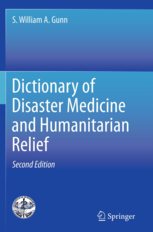
Dictionary of Disaster Medicine and Humanitarian Relief, 2nd Ed.
Gunn, S. William A.
2nd ed. 2013, XXIII, 208 p.
ISBN 978-1-4614-4445-9, Springer 2013
In times of emergency, clear communication is critical to saving lives and preventing further destruction. Operations in the field, negotiations between governments and relief organizations, and planning and training sessions all require collaboration among people from various disciplines using different terminologies. Without a common lexicon, misunderstandings and other communication errors can lead to the loss of valuable time, scarce resources, and lives—and during an era marked by climate disasters, warfare, industrial accidents, and threats of bioterrorism, the stakes are increasingly high.
It is in this spirit that the original Dictionary of Disaster Medicine and Humanitarian Relief was assembled, and the same holds true for this timely Second Edition. This practical resource boasts more than twice the number of entries as the first edition: definitions, abbreviations, and acronyms covering all phases of humanitarian aid, from planning and preparedness to rescue and recovery. Its contents have been field-tested across the emergency intervention community, and are as useful in communicating with the media and the public as with colleagues.
This expanded edition of the Dictionary of Disaster Medicine and Humanitarian Relief ably follows its predecessor as an authoritative resource for researchers and professionals in global health, health promotion, public health, public health policy, and disaster management.
—
Wie berichtet, bietet die ZB Med seit Juni 2012 allen Ärzten und Wissenschaftlern der Medizinfakultät ein Portal an, um E-Books zu bestellen. In der Regel werden diese Bücher von der ZB Med bezahlt, sind also für den obigen Personenkreis kostenfrei. Der Clou ist, dass diese E-Books nicht nur dem Besteller zur Verfügung stehen, sondern allen Angehörigen der Universität Münster.
Im Gegensatz zu unseren übrigen E-Books, die eine unbegrenzte Nutzung erlauben, können diese einzeln desiderierten Titel jedoch nur von einem Nutzer gleichzeitig aufgerufen und sofort am Bildschirm gelesen werden. Lediglich zum Herunterladen, Annotieren und Verwalten muß man sich bei Ebrary registrieren.
Im OPAC, dem Buchkatalog der Universitätsbibliothek, kann man gezielt nach Online-Büchern suchen. Zugänglich sind diese Bücher nur im Hochschulnetz der Universität.